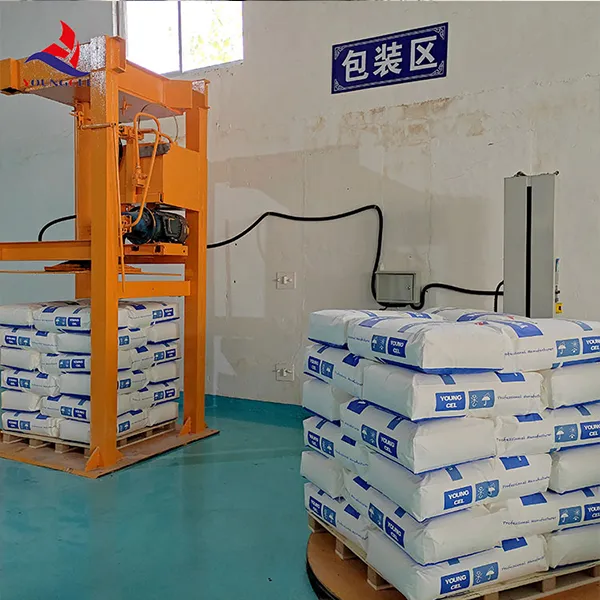HPMC Tylos An Essential Polymer in Modern Industries
Hydroxypropyl Methylcellulose (HPMC), often referred to in industry circles as Tylos, is a versatile and widely used polymer that has gained significant attention across various sectors. Its unique chemical properties make it suitable for a vast range of applications, from pharmaceuticals to construction materials, and even in the food industry.
What is HPMC?
HPMC is a semi-synthetic polymer derived from cellulose, which is a natural polymer found in plant cell walls. The modification process of cellulose to produce HPMC involves the substitution of hydroxyl groups with hydroxypropyl and methoxy groups. This modification significantly enhances its solubility in water and improves its functional properties. The result is a white or off-white powder that is odorless and tasteless.
Properties of HPMC
The remarkable properties of HPMC contribute to its widespread use. Among these properties are its high viscosity, excellent film-forming ability, and compatibility with various substances. HPMC is non-toxic, biodegradable, and largely inert, making it a favorable choice in applications where human safety and environmental impact are concerns.
In addition to these properties, HPMC also exhibits thermoplastic behavior. This means that it can be processed into different shapes and forms when heat is applied, without losing its chemical integrity. Its ability to form gels and retain moisture further enhances its versatility, making it ideal for applications requiring thickening, emulsifying, or stabilizing agents.
Applications of HPMC
hpmc tylos

1. Pharmaceutical Industry In the pharmaceutical sector, HPMC is primarily used as a binder and thickener in tablet formulations. Its hydrogel-forming capabilities allow for controlled release of active ingredients, enhancing drug delivery systems. Moreover, due to its film-forming properties, HPMC is also utilized in coatings for tablets and capsules, providing stability and protecting the active ingredients from degradation.
2. Construction Materials HPMC is increasingly used in construction, particularly in dry-mix mortar and cement formulations. Its addition to cement and tile adhesives improves workability, enhances water retention, and provides better adhesion. This is crucial for ensuring the longevity and performance of construction materials in various environmental conditions.
3. Food Industry In the food sector, HPMC serves as a thickening and emulsifying agent. It is often used in food products such as sauces, dressings, and dairy products to enhance texture and stability. As a fat replacer, HPMC can also be utilized in low-calorie food products, appealing to health-conscious consumers while maintaining desirable mouthfeel.
4. Cosmetics and Personal Care The cosmetic industry employs HPMC for its thickening and film-forming properties. It can be found in lotions, creams, and gels, where it not only enhances texture but also contributes to the product's stability. HPMC ensures that these products remain uniform in consistency, providing a pleasant user experience.
5. Agriculture In agriculture, HPMC is used as a soil conditioner and in the formulation of various agricultural products. Its water-retention capabilities aid in improving soil moisture content, thereby supporting plant growth. Additionally, HPMC can be utilized in controlled-release formulations of fertilizers and pesticides, promoting sustainable farming practices.
Conclusion
HPMC Tylos, known for its multifunctionality and safe profile, plays a crucial role in modern industry. Its ability to enhance product performance, coupled with its environmental safety, makes it a preferred choice for manufacturers across various fields. As industries continue to seek sustainable and effective solutions, the importance of HPMC is bound to grow. Innovations in the formulation and application of HPMC will likely open new avenues, ensuring that it remains an integral part of the industrial landscape for years to come.
In summary, HPMC Tylos exemplifies how a simple modification of a natural polymer can lead to extensive applications and significant advancements in many fields, highlighting the potential of synthetic derivatives of natural compounds in our modern world.
-
Rdp Powder: Key Considerations for Wholesalers in the Building Materials IndustryNewsJul.08,2025
-
Key Considerations for Wholesalers: Navigating the World of Hpmc - Based ProductsNewsJul.08,2025
-
Hpmc Detergent: Key Considerations for WholesalersNewsJul.08,2025
-
Key Considerations for Wholesalers: China Hpmc For Tile Adhesive, Coating Additives, Concrete Additives, and MoreNewsJul.08,2025
-
Crucial Considerations for Wholesalers: Navigating the World of Construction MaterialsNewsJul.08,2025
-
Key Considerations for Wholesalers Sourcing Additive For Cement, Additive For Concrete, Additive For Putty from Additive Manufacturer Shijiazhuang Gaocheng District Yongfeng Cellulose Co., Ltd.NewsJul.08,2025




